#curtain walling project in Cornwall
Explore tagged Tumblr posts
Text
Transform your property with premium curtain walling in Devon & Cornwall, combining sleek aesthetics with outstanding functionality. Ideal for commercial, residential, and industrial applications, our curtain wall systems enhance natural light while offering exceptional weather resistance and structural integrity.
🌟 Benefits of Our Curtain Walling Systems
Modern Aesthetic Appeal: Create striking facades with clean lines and expansive glazing.
Natural Light Maximisation: Increase daylight entry for a brighter, more inviting interior.
Energy Efficiency: High-performance thermal breaks and glazing options reduce energy consumption.
Weatherproof Design: Protects against wind, rain, and temperature changes.
Customisable Options: Tailored to fit any architectural style with a variety of finishes and configurations.
Durable Materials: Built with premium aluminium and high-grade glazing for long-lasting results.
Our expertly designed and installed curtain walling systems provide a perfect blend of style and substance. Whether you’re upgrading a modern office or revitalising a retail space, our team ensures precise fitting and exceptional results.
📞 Contact us today for a free consultation on your curtain walling project in Devon & Cornwall. Let’s create a façade that stands out!
0 notes
Text
you may be my poem.
flint/silver - rated m.
length 2.9K.
Part one of two. (Ao3)
Chapter One - the soul to tenderness.
The wind skittered across the deck as the light of the hot sun glinted off the surface of the water in golden fractals; the crew were working hard on the sails as they flapped in the wind. The Captain’s cabin was quiet, apart from the occasional shout or creak; it was as peaceful there as it ever was in the sea. Flint sat behind the Captain’s chair once more, feeling the surge of power rushing through his bones, not only had he taken his crew back with just a few short words, but he’d taken a fucking warship. He turned the chair to the windows and watched as the ship carved out its path in the water, white foam capped the tips of the waves, Flint rose and opened the windows, letting the cool sea air flood the cabin. It felt good to let the wind through his hair, to feel the salt of the spray of the sea on his face. Life was going to change once they reached Nassau, things were going to be different, he would be sure of it. The Urca gold was going to shift the perception of what Nassau would be capable of; Flint smiled as he imagined the gold, piles of it lining the pockets of Nassau, making war with England possible. He would do what he and Thomas had set out to do; he would honour his legacy, the memory of the man that he had loved. Though he was jerked out of his thoughts by the creaking of the door.
“How you’re sitting there, now, I don’t know.” Silver said coming into the cabin without knocking, Flint looked up at him and raised an eyebrow, “one minute, you’re looking at being strung up by your neck and the next you’re captaining a fucking warship. I do not understand how you talked yourself out of that one.”
“I don’t know why you think that you can waltz in here like you own the place like you think you can do whatever you want,” Flint growled, even if Silver had pulled him from the water, that didn’t make them friends.
Like he was won’t to do, Silver ignored Flint and sat in a chair opposite his desk; he leaned back, kicking his boots up and on to the mahogany. “I saved your life, you at least owe me a chat, right?”
“No,” Flint said, shaking his head and getting up to try and shift Silver out of his cabin. “I owe you nothing, you’re lucky you’re still alive. Don’t push it.”
“The men say you visit a witch whenever we make port,” Silver tipped his chin so that he could look Flint in the eye; Flint paused where he was, freezing and looking at Silver. His eyes were blue, blue as the sea on which they sailed. “They say that she cursed you so that you always have to return to her. That she’s-“
“Controlling me like a puppet, I’ve heard the rumours, what of them?” Flint moved backwards and sat in the chair, knocking Silver’s boots off the desk as he did so.
“I was just wondering if it was true,” Silver shrugged, “I met a witch once, I went to Salisbury for the day, to see the standing stones there, a witch jumped out of a hedgerow; or well she said she was a witch, I don’t actually know. Certainly, she was green enough, but I’m not sure whether that was the alcohol or not.”
“She’s not a witch,” Flint mutters, “more like a ghost I cannot rid myself of,” he sighed, “so you want to know more about my past, well Mr Silver, how about you tell me something that isn’t a lie and then maybe we can talk.”
“I was born in Bristol,” Silver looked at him from under his eyelashes, he took a deep breath, and the cocky smile that usually took residence on his face dropped and was gone, “then my mother got sick and well, we all know what happens to boys who find themselves without parents. I got sent to an Orphanage. St Cecilia’s.”
“Well.” Flint sighed “that’s not much of a story.” He smiled and reached for a bottle of rum that he kept under his desk. “Padstow for me. In Cornwall. My father was a fisherman, then he was a carpenter, then well… then my mother died and so did my younger brother and then my father was nothing really at all.”
“Apparently we’ve both had shit lives then,” Silver sighed, now that he was talking about his past, it was incredibly difficult to stop. The words came rushing out him like water from the mouth of a river, they poured from him and he was unable to stop them, “when I was twelve I was apprenticed to a blacksmith. I was told by the other boys there that he was a… a- well, you know. And then I started sleeping with a piece of glass under my pillow, but it wasn’t enough apparently.”
“That’s pretty shit,” Flint snorted, “did you slit his throat?” He poured Silver another large measure of the rum, before lifting his tankard to his lips and drinking in deep.
“No,” Silver shook his head, he wasn’t looking at Flint, his eyes were focussed on his lap, “didn’t have the guts to. I ran away about a year later and joined the Merchant Navy not long after, no skills, nothing to offer. But they took me anyway, trained me as a rigger, didn’t have the stomach for heights so after that I was just a dogsbody but it was better than being in Bristol. There, nothing I told you was a lie. Now we can talk,” Silver looked back up, his blue eyes crinkled in thought, as he watched Flint drink more from his rum.
“Now we can talk,” Flint inclined his head, “you want to know about Miranda?” He asked, watching Silver’s expression shift when he mentioned her name.
“I wanted to know the truth behind her,” Silver nodded, he coughed, leaning back in his chair and taking a mouthful of rum, “I didn’t want this to bite us in the arse.”
Flint looked around to the sea, the windows were still open but the breeze was no longer coming through them; the cabin seemed closer and smaller than it had done when Silver had been talking about his life. The walls of the ship were closing in on him and the heat in the small room was rising steadily. Flint felt a drop of sweat roll down his back and soak into his shirt where his belt kept the material close to his skin. A part of him wanted to shut down this conversation, wanted to tramp out the desire that Silver had to learn about him and his past. His ghosts belonged to him and him alone, Silver had no right to ask about them, but Flint had been an island for too long; there was no way he could work alone anymore. Not with his crew balanced on the edge of a knife, and Silver was frightening clever. He considered the man sitting before him before he opened his mouth to speak.
“I was sent to Thomas Hamilton to be his liaison from the navy, I was supposed to dissuade him from plans he had for Nassau. In the end, though, I rather did the opposite; I was convinced that he held the answer to save Nassau, to stop the colony from failing and make it new. Thomas brought me into his plans and he had me wrapped around his little finger. I was trapped in his spider's web but, make no mistake, I wanted to be there. Miranda, or Mrs Barlow, as you know her, was Thomas’s wife.” Flint choked on the last word, he hated talking about Thomas in the past tense, it made him feel sick. “We started an affair, and then his father found out. Thomas was sent to Bedlam and I was ordered to leave London and never come back. I never saw him again. But I brought Miranda with me, she was ordered to leave too and well I swore to myself that I would protect her, give her a life that Thomas would want for her. I broke that promise but I will help her in any way I can. I love her, I suppose.” Flint sighed, he had never told another soul about his past, never, it was cathartic in a way. Silver for all that he could talk was also quite a good listener; he kept quiet and non-judgemental, just sipping on his rum and occasionally shifting in his seat.
“You’re,” Silver gasped when Flint had stopped speaking, “you. You and Thomas, were, together, no offence, Captain but you didn’t strike as the type.” Silver started to smile when he caught Flint’s shocked look. “You didn’t think I’d care? I lived in an all-boys orphanage for years, I know exactly what goes on. Really, I was in the Merchant Navy, you don’t think I’ve not…” He gestured with his hand, and Flint saw an image of Silver on his knees flash before his eyes quite unbidden. “I couldn’t care less about whatever happened between you and Thomas, but I need to know that Miranda won’t affect us, that she won’t ruin this thing with the Urca gold.”
Flint didn’t say anything for a few seconds, he took a pause to breathe, whatever he’d expected Silver’s reaction to Thomas and him, it was not this. Silver could have gone screaming to the crew, or been disgusted; this nonchalance thought was not what Flint had thought would happen. It shocked him a little, enough to make him stop and consider the man in front of him. He knew that Silver was attractive, all tanned skin and curly hair with eyes a brighter blue than they had any right to be, but the problem was that Silver himself knew he was attractive. Flint had never found that trait in people enticing, but Silver somehow made it so.
“She won’t,” Flint waved his hand and with Silver’s nod, that part of the conversation was dropped. Flint poured more rum.
Soon the sun dropped below the horizon, and somehow lanterns in the cabin were lit, and Silver and Flint were still talking and drinking. Flint wasn’t sure when the atmosphere in the room shifted, like curtains that had been hanging dropped and now Flint could see the whole picture. The way he viewed Silver changed; from the annoying, dishonest thief, Flint now saw the man beneath those things that he projected to the world. Flint watched as Silver tied his hair up into a ponytail, moving the curls away from his face; it made him look older, made the crows feet at the corner of his eyes stand out more. They continued the routine that had started when Silver told Flint of his past, it came to the part where Flint shed James McGraw.
“I suppose,” Flint sighed, leaning his elbows on to the table and resting his face in his hands, “I suppose he had to die, James McGraw would not have survived Nassau.”
Silver watched him, Flint could see the other man through his fingers, but Silver made no move to speak. Seconds ticked by on the clock on the mantle, and still Silver did not speak. A full minute must have passed, with the two of them watching each other before Silver opened his mouth.
“I should have liked to have met him,” Silver said softly, leaning forward in his seat, “James McGraw, I would have liked to meet him. He sounds like a good man.”
“He was,” Flint grunted, shaking his head, the alcohol had fogged his senses; it had been a while since he found himself at the bottom of bottle four. “I suspect you’d not like the man I was, I know he’d have hated you.”
“Oh yeah?” Silver had his smirk back, and there was nothing Flint wanted more than to wipe it off him. “How’d you know? Maybe we could have been friends.” Silver paused again, as he leaned back in the chair, crossing his arms, and smirking all the while. He seemed to dismiss the thought in favour of running his tongue over his top lip, when he next spoke, his words were slow and deliberate. Silver’s eyes sparkled, a colour Flint had only seen in the hottest flames, “But, Captain, what does James Flint think of me?” He said.
Flint was frozen to his chair, he did not move, he barely breathed, something was happening and this was the last chance to stop it. “He,” Flint choked before he brought his brain back to his body, and then the fuzzy feeling from the alcohol was gone and he was once again present in the moment. The world was back in focus and he was in his body once more, terrifying and exhilarating at the same time, like riding the top of a huge wave as it crashed and rolled down back into the swell of the sea. “He hasn’t quite made up his mind.”
“Is there anything I can do to help?” Silver moved then, standing from the chair in one languid motion as he rolled his body forward.
Flint didn’t even think, or there were simply too many thoughts surging through his mind to focus on just one, he moved at the same time, standing and twisting around the desk. They met halfway. The two of them, so often at odds but now it was as though they were linked together with invisible cords. Suddenly, all at once, Silver was everywhere; he was crowding into Flint’s space. Hands were Flint’s shoulders, they gripped at him with sinewy strength, and Flint could slowly feel himself giving in. This was different than his first kiss with Thomas, there was no cautious hesitation here, though they were not yet kissing. Desire, hot and sharp had overtaken them. And Silver was there, in front of him, with his eyes the colour of the sun-bleached sky as it reached above the sails on a hot day.
Silver smiled, teeth white against his tan skin, Flint’s eyes couldn’t help but dart down to Silver’s lips. Their noses brushed as they fell together, caught up in the heat of the moment and their desires, Flint's hands reached around the back of Silver’s head, finding the leather tie and letting his hair fall loose around his shoulders. Flint pressed their foreheads together and they paused like that for a moment, time stretched itself around them as the ship rocked with the waves in the open sea. Silver smelled like the sea, all salt and the freedom of the sweeping waters, he looked up at Flint a blush spread on his cheeks pinking them. One of Flint’s hands was still tangled up in Silver’s hair, resting at the back of his neck; his thumb was rubbing small circles into the skin there.
They breathed together a moment's silence while the ship creaked around them, Flint loved the feeling of the swell and ebb of the sea underneath him; he revelled in it and the warmth of Silver’s body pressed up against his own. Still, they did not kiss, Flint had every intention of making this moment, these few seconds last longer than they had any right. Silver did not seem to mind as his eyes darted around Flint’s face, as though he was memorising every line, each freckle, and scars that littered Flint’s skin. One of Silver’s hands moved from Flint’s shoulders, and a rough fingertip traced its way along the side of Flint’s face, along the side of a scar; Flint could not help himself as he leaned into the touch. Flint could feel Silver’s body heat radiate out from under his clothes, he longed to slide the man’s coat off, so that he could glimpse the heated flesh underneath it; he could see a sliver of Silver’s chest where his shirt had fallen open, it was the same shade of pink as Silver’s cheeks. Flint longed to press a kiss to it, to the dip between Silver’s collar bones.
Silver’s eyes fluttered shut, as he finally closed the scant distance between them. The kiss, when it finally happened is sweeter than Flint expected it to be. A press of lips against his own, Silver’s hand was properly cupping the side of his face. Flint was lost in the touch, he was buoyed along with the crests of it, and he gave himself over to it entirely. Silver made the most delicious sound Flint had heard, as he was back up against the side of the desk, one of Flint’s thighs sliding home between his.
“Fuck,” Silver said when they broke apart, “fuck, Captain.” He was grinning, looking up at Flint utterly debauched.
Flint said nothing in return, instead he chose to finally, finally, slide Silver’s coat off his shoulders; Silver was more well-muscled than Flint expected him to be, it was a pleasing surprise. Flint was content with simply spending the rest of his night like they were. It seemed, though, that the other man had another idea; Silver turned and pushed everything on the desk off it, as he hopped up on to the mahogany surface. Silver spread his legs and drew Flint between them, and there cradled between Silver’s thighs, Flint found Home.
A/N: Thanks for reading my first Black Sails fic!!! If you liked it please consider reblogging!! If you reblog maybe add tags????? Message me what think!! Thanks again!!! Consider leaving a comment on the AO3 version liked above!!
#silver/flint#flint/silver#silverflint#flintsilver#captain flint/john silver#silverflint fic#fanfiction#otp#first kiss#black sails#black sails season 2#my writing#my fic#my stories#john silver#long john silver#;)#captain flint#james flint#james mcgraw
10 notes
·
View notes
Text
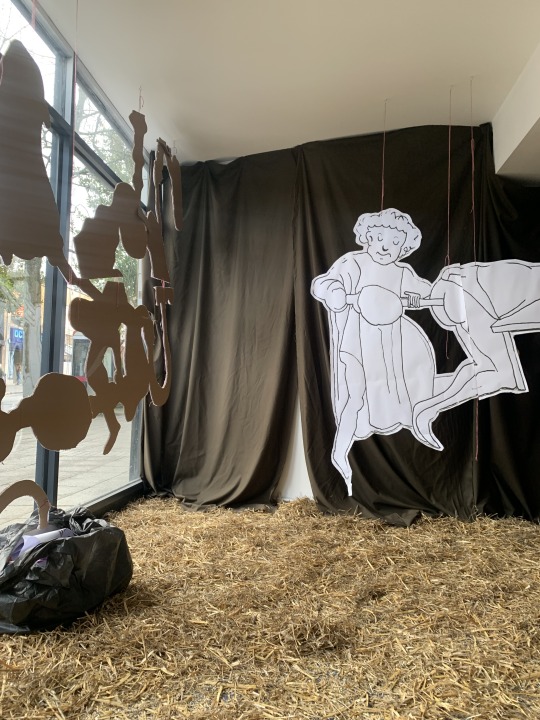
The Tale of the Tattoo'd Pig - catchup
It's been a while since I've last posted because I've been suddenly and unexpectedly busy.
Working the British Art Show 9 as invigilator has seen my confidence grow a lot, and whilst I was attending Hardeep Pandhal's artist talk at KARST, I introduced myself to Tom Milnes, the project manager of AUP's Cornwall Street Project Space. I had seen that, through the Meanwhile Use scheme, AUP had been using this empty shopfront to showcase staff, student and alumni's work. At the last minute, Tom contacted me asking if I'd be up for filling a gap in their schedule. I had no work ready for an exhibition of this kind of scale, but I knew I couldn't say no to the opportunity to have a solo show.
Following the feedback I got at the end of last year (that I needed to more carefully think through my installation plans), I saw this as the perfect opportunity to practice installation and spatial presentation of work. In crits, everyone always encourages me to think big, and consider presenting my work in an immersive environment, which I finally had the opportunity to do.
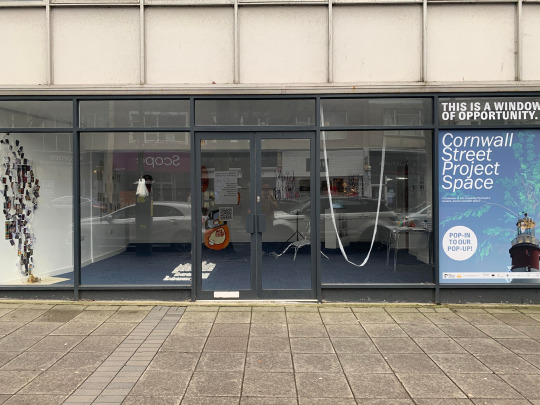
(the previous exhibition, of work by AUP BA Fine Art students - a challenging gallery space to use well)
The Cornwall Street space is a challenging one in many ways: the room is an empty shopfront, its architecture acts sort of like a funnel and none of the walls are really appropriate for 2D work. The overhead lighting is horrible and blue. The carpet is also horrible and blue. I knew that people would only be able to enter the space on one evening - the opening - and that otherwise the interactions viewers would have with the work would be through the window.
My plan was to make an exhibition that could primarily be seen through the window, but could also act as a kind of set for a performance on the opening night - something that was immersive for viewers who entered the space, but also captivated people who were just glancing at it from outside.
The first thing I did was cover the floor in straw. Straw is very cheap to buy, and very quickly covered up the nasty blue carpet (this was important to me because blue as a colour in the context of faux-medieval storytelling represents wealth and nobility). It's also a sort of shortcut to making a space feel immersive: it brings with it a strong, musty smell; it dampens sound and adds a new sound of its own (rustling under feet); it changes the colour of the floor. I wanted to bring the world of the fiction out into the space - straw being a medieval material, and also a material that sits at the intersection of human and animal relations (bedding for livestock or pets, food, natural yet manmade). The abundant presence of a classically "outdoor" material in an ordinary indoor space created a kind of surreality to the exhibition as well. I knew it would attract the attention of passersby.
I bought a roll of cheap, brown fabric from the scrap store to hang on all the walls. The presence of hanging fabric suggests curtains, making the space feel theatrical, but also on a practical level it covered up the noisy and irregular walls.
Regarding the work I decided to present, I opted to centre the show around the chapter of Dinner Machine: The Tale of the Tattoo'd Pig. This chapter was one I had finished and polished last year, and from which I performed an extract at the final show. This chapter makes the most sense to perform live as it is primarily dialogue. Also, knowing this event would be organised entirely around this one reading, I felt I could perform the whole scene rather than just an extract, which was exciting.
So far this academic year I have been working on drawing comic pages of Chapter 1, which have been taking a long time and are not appropriate to show in this kind of way, so I decided to quickly make new work to show instead. I scanned and enlarged some of the marginalia doodles I had been doing, and scruffily attached them to large pieces of cardboard. I wanted them to appear somewhere between a cardboard standee and a piece of theatre set dressing.


This was pretty much my first time working on such a large scale, and working so quickly, but I don't think they ended up looking rushed in the same way my installation did at the end of last year. I think (hope) they appeared scruffy in an intentional way, but well considered. I hung them from metal hooks with butcher's twine.
Here's a link to a previous blog post about the imagery itself (the butt trumpets): https://terrariumfiction.tumblr.com/post/702731762011455488/butt-trumpets
I thought these would work well because they are so crude and juvenile; they are quite approachable images to a range of audiences, and are maybe an unexpected thing to see when walking through the city centre. I hid the most confrontational one (FUCK THE LORD - TRUMPET TOWARDS A REPUBLIC) at the back, which was pretty much too shaded to see from the street.
As well as these large, mechanically-reproduced drawings, I wanted there to be a smaller-scale piece of work as well, that would warrant closer inspection on the opening night. It was my plan to source some pigskins, tattoo them, and crudely preserve them (with salt and alkaline solution akin to the tanning process). The other materials I had used in the production of the work (paper, board, staples, thread, fabric) were all materials that go into bookbinding, and I thought that presenting a drawing work that was ink on animal skin would more firmly link these bookmaking processes and their visceral histories. I couldn't find any pig skins in the end, so did some drawings with a dip pen on textured paper. I cut and hung these drawings to appear like animal hides do when they're being turned into parchment.
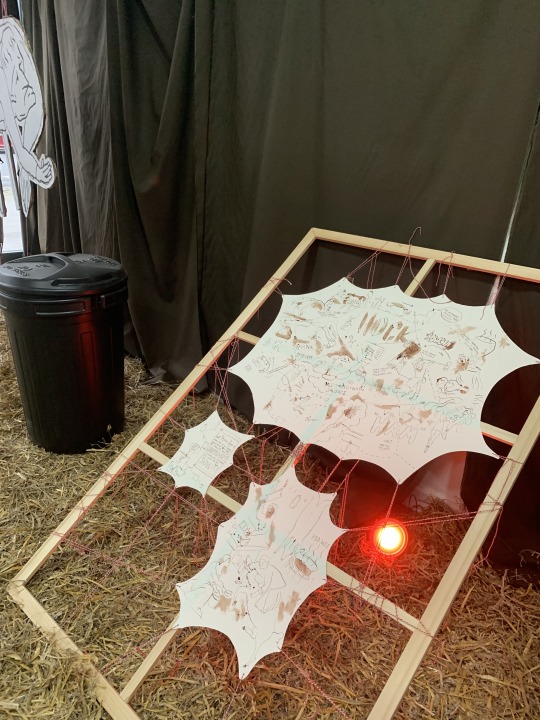
These drawings more closely illustrate the chapter I was to be performing - showing copies of medieval images of slaughter. There's a weird cartoonish glee to the violence in these images, that I supplemented with contemporary cartoon language. I sort of wanted these drawings to appear like "flash sheets" - pages prepared by tattoo artists of smaller tattoos that can be readily purchased.



The text in the scroll on the top right image is from Umberto Eco's essay 'Dreaming of the Middle Ages'; I wanted these works to present (loosely) some of the critical contexts within which this project sits - ideas of neo-medievalism, ecological philosophy, etc. The annotation "BECOMING-WITH SAUSAGE", for example, playfully references Donna Haraway's notion of "becoming-with" discussed in Staying With the Trouble.
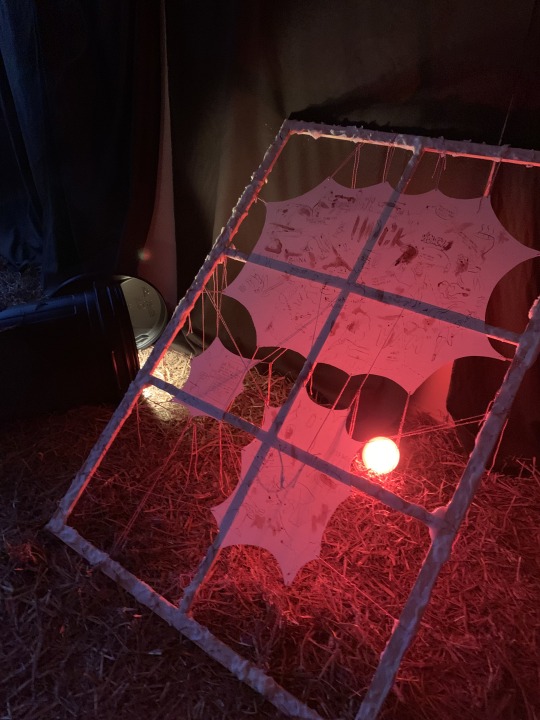
To give the work the uncomfortable presence of animal-made-material, I smeared the frame with lard.
Next post will be about the performance itself. Below, please find more pictures of the installation.
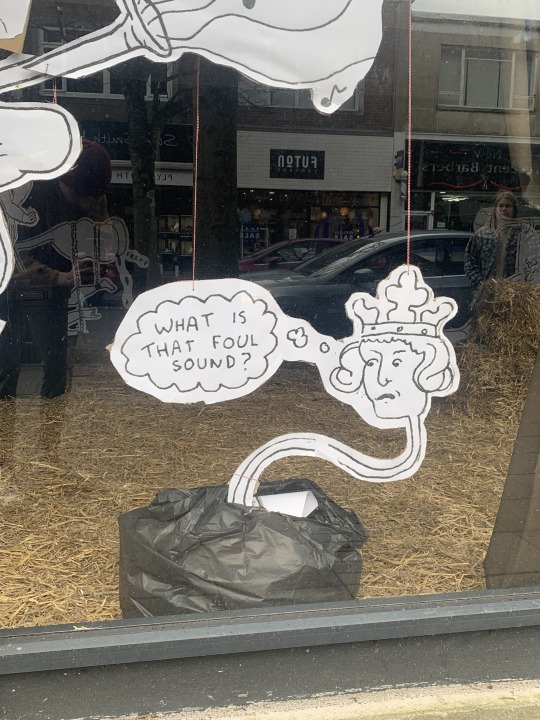

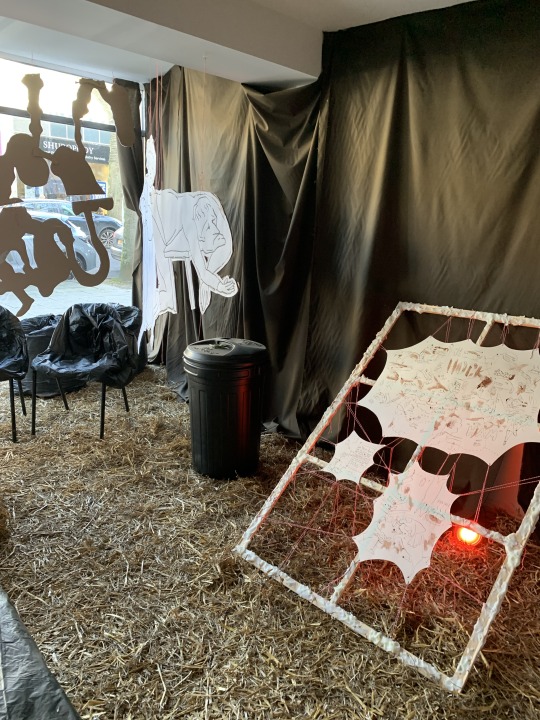

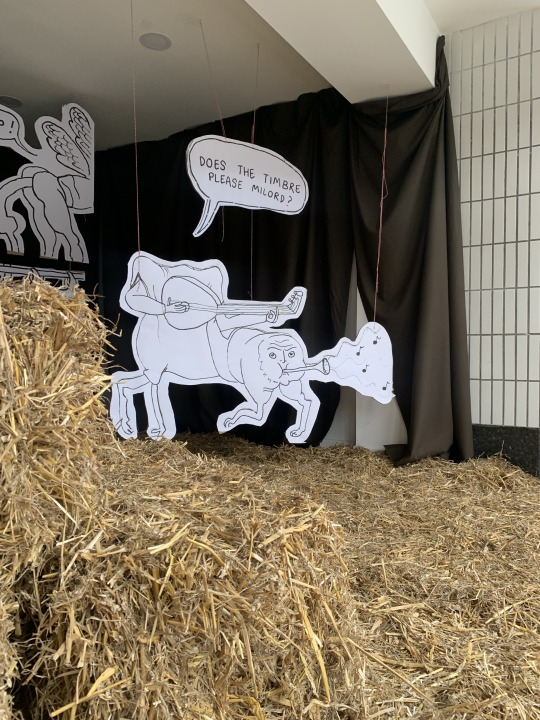
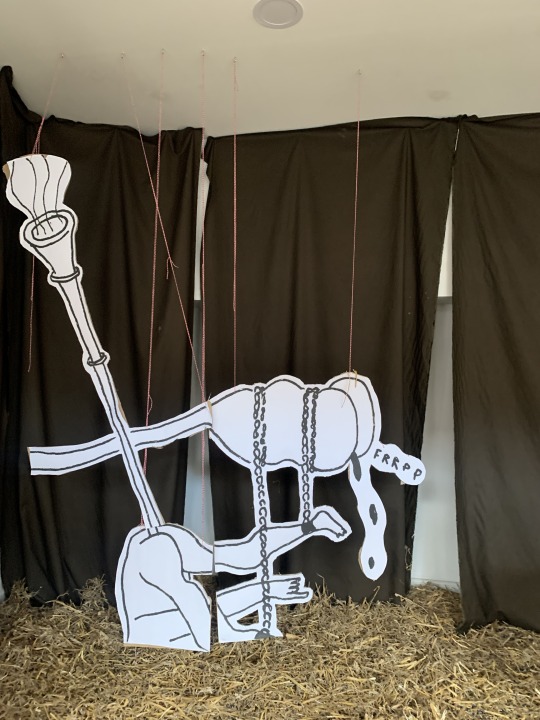
1 note
·
View note
Text
Curtain Walling Devon | Commercial Installations Cornwall
ADS Commercial are based in Devon, and we are professional suppliers and installers of curtain walling. Our products and services are available for commercial projects throughout Cornwall, Exeter, Plymouth and Torquay. Find out how we can help with your next project by requesting a quote from us today.

0 notes